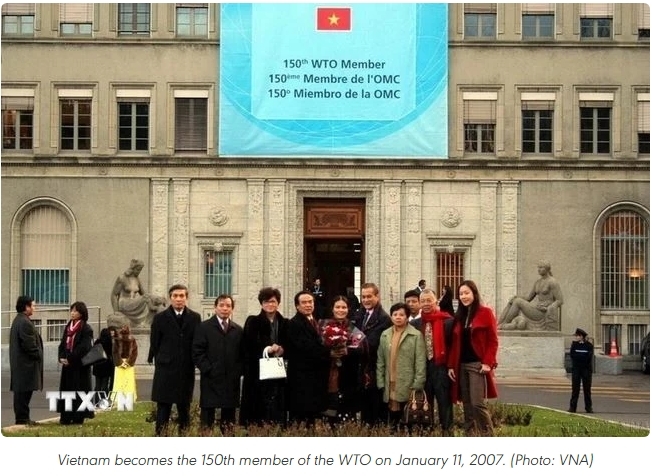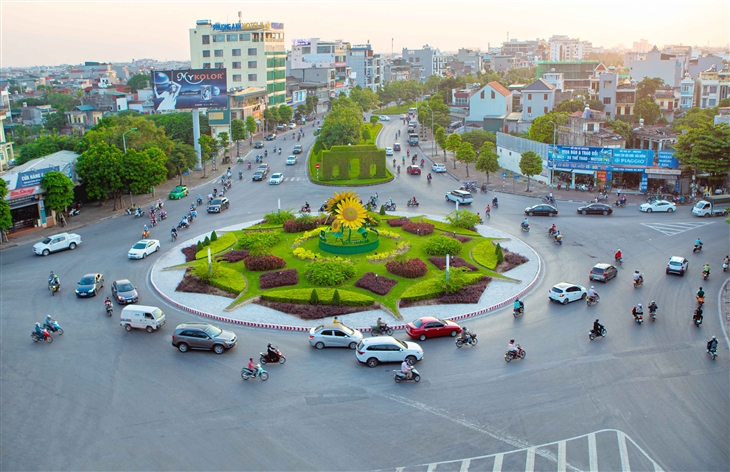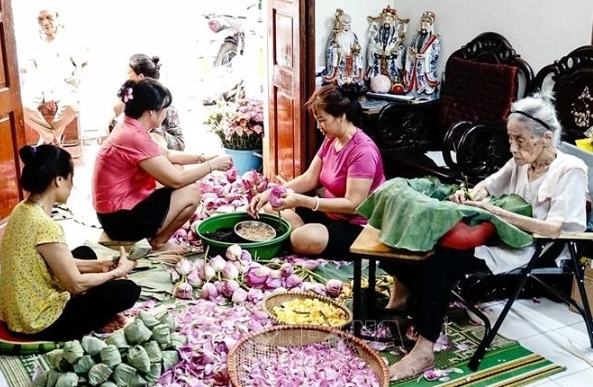Vietnam’s WTO journey: From economic integration to global trade powerhouse
Wednesday, November 6,2024
AsemconnectVietnam - Vietnam's signing of the World Trade Organisation (WTO) accession protocol in Geneva on November 7, 2006, and its subsequent entry as the organisation's 150th member on January 11, 2007, marked a pivotal turning point in the nation's development. Over the past 18 years, this membership has strengthened Vietnam’s position in global value chains while demonstrating its strong commitment to international economic integration.
Important milestones in global economic integration
The WTO, established on January 1, 1995, stands as the sole international body governing global trade rules. With 165 member nations accounting for over 90% of the global trade, its core mission is to promote fair and free trade among nations, reduce trade barriers, and support members' economic development.
The organisation operates under six key agreements covering goods trade, services, intellectual property rights, dispute settlement, trade policy reviews, and WTO establishment protocols. Its fundamental principles of non-discrimination, transparency, and fairness, among others, have encouraged member states to open their markets and enable domestic businesses to compete internationally. The development of the WTO has also pushed its members to develop sustainably, improve their legal basis, and complete economic and financial system in accordance with the requirement of the international integration.
Vietnam's path to WTO membership spanned more than a decade, from 1995 to 2006, requiring complicated bilateral and multilateral negotiations. The country underwent significant legal reforms and economic restructuring to meet WTO requirements before securing the membership.
The country’s signing of the WTO accession protocol in Geneva in 2006 represented a watershed in its international economic integration. The nation's rights and obligations as a WTO member took effect on January 11, 2007.
The decision to join the WTO not only ushered in a new era in Vietnam's international trade relations but also created significant opportunities for domestic businesses. The membership provides Vietnam with a foundation for comprehensive economic policy reforms, export market expansion, and enhances competitive edge. However, the process also challenges Vietnamese enterprises, requiring them to improve product quality and better prepare to meet stringent international market standards.
Affirming position in regional, international arenas
Vietnam’s efforts to open its market, promote institutional reforms, and fortify international cooperation have paid off, with exceptional trade growth and substantial foreign investment that have contributed to creating a facelift for the country’s economic landscape as well as cementing its position in the regional and international arenas.
Since its accession to the WTO, the country has obtained significant trade achievements. Its export revenue rose from over 48 billion USD in 2007 to more than 371 billion USD in 2022.
Vietnam has emerged as a significant player in global trade, currently ranking among the world's top 20 trading economies. The country has maintained a trade surplus for eight consecutive years, increasing from 1.77 billion USD in 2016 to over 28 billion USD in 2023.
Manufacturing and high-tech products now dominate exports, accounting for 85% of total export value in 2023. Telephones, electronic components, machines, equipment, and textile have been the key export items, contributing to the country’s trade success and helping improve the domestic firms’ competitive capacity in the international market.
The WTO membership has not only accelerated Vietnam’s trade growth but also expanded its economic partnership and diversified its export market. As of October 2024, Vietnam had signed and carried out 17 free trade agreements while negotiations are underway for two others. Several new-generation trade pacts such as the EU – Vietnam Free Trade Agreement and the Comprehensive and Progressive Agreement for Trans-Pacific Partnership have secure Vietnam’s broader access to major markets, thus boosting the competitiveness of its exports.
According to the General Statistics Office, progress has been seen in the trade ties with the EU, the US, Japan, the Republic of Korea, and China, making Vietnam an important player in the Asia – Pacific region.
Besides, the WTO accession has been significant to the country’s foreign direct investment (FDI) attraction. In 2008, 36.6 billion USD of FDI was injected to the country, a three-fold increase from the previous year. The figure in 2023 was 36.6 billion USD, solidifying the country’s position as a premier investment destination in the world. Tech giants such as Samsung, Intel, LG, and Foxconn have established production bases in Vietnam, integrating the country deeper into global supply chains.
Additionally, the engagement in the WTO has push ahead the country’s strong reform of its legal system and economic institutions to enhance transparency in economic management, better business climate, and improve its position internationally.
According to the World Economic Forum, Vietnam’s Global Competitiveness Index (GCI) moved up 13 places in the 2007 - 2017 period, from the lower half of the rankings to the upper. In 2019, its GCI improved 10 places to the 67th position among the 141 economies.
As the integration process has brought challenges to the country, including trade defense measures from major markets like the US and the EU, experts suggest Vietnam strengthen its trade defense capabilities by providing training for officials and enterprises. Besides, they said it is necessary to shift from assembly-based manufacturing to higher value-added production to improve the country's competitive edge and mitigate impact of the international trade policies./.
Source: en.vietnamplus.vn/vietnams-wto-journey-from-economic-integration-to-global-trade-powerhouse-post301469.vnp
Vietnam, Canada enhance cooperation, connections
PM pushes for stronger Vietnam-UAE economic ties at business roundtable
PM receives heads of UAE corporations
PM meets with leader of Russia's Rosatom
Hanoi seeks to tighten trade, investment links with RoK
US initiates administrative review on Vietnam’s oil country tubular goods
Peru’s mega-port to open opportunities for Vietnam's import-export, logistics
Crude oil importing to Vietnam increase sharply
Senegal considered as potential market for Vietnamese agricultural products
Experts optimistic about Vietnam-Australia relationship future
US extends issuance of final findings of anti-dumping duties on Vietnamese honey
Vietnam, RoK expand cooperation on smart city building
Vietnam, Romania strengthen cooperation in trade, automotive manufacturing
Vietnamese, Chinese leaders urge businesses to strengthen economic ties

Plan of Hai Duong province for a period of 2021 - 2030, ...
Organize space reasonably and harmoniously, focusing on connecting Hai Duong in common development space, actively contributing to the ...Plan of Hau Giang province in a period of 2021 - 2030, ...
Sustainable forestry development program in a period of ...

Hanoi lotus-scented tea making craft listed among national ...
The Ministry of Culture, Sports, and Tourism has issued a decision recognising the traditional craft of making lotus-scented tea in Quang ...Vietnam festival helps tighten friendship with Japan
Vietnam to play friendly matches with Thailand and Russia ...



